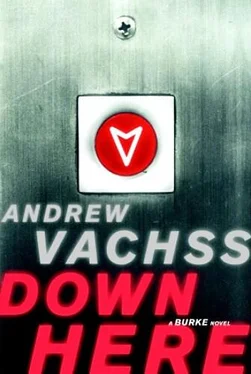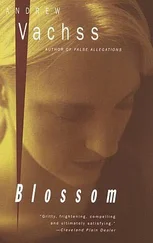“Twenty-five hundred?” I guessed.
“Closer to thirty -five,” she said. “See what I mean about a bargain?”
“I guess that depends on what you paid. But I can’t imagine anything like this going for less than—”
“Right around four hundred,” she said.
“About the going rate for a decent two-bedroom on the Upper West Side.”
“You wish,” she said. “For that kind of money, you’re buying a rehab project.”
“Well, this one sure didn’t come the way it is now.”
“Oh, that’s true,” she said, perching confidently on one of the modern chairs. “But I didn’t have to do structural stuff. It wasn’t really all that expensive. And it’s a good investment.”
“That I can believe,” I said, sitting down myself.
“I’m going to go change,” she said, getting to her feet. “Take a look around, you’ll see what I mean.”
Ilistened to her heels click on the hardwood floors. Couldn’t pick up the sound of a door closing anywhere, but that didn’t tell me anything—the walls were thick, and the bedroom was a couple of sound-muffling turns away.
She’s gone from arm’s-length to “make yourself at home” pretty damn quick, I thought. But there were too many possibilities, dice tumbling in my head.
I stood up, made a slow circuit of the living room. In one corner, I found a white pillar so smoothly mounted it looked as if it had grown from the floor. On its base, a black-glazed pot sat in a tray of gray pebbles, still gleaming from its last watering.
Inside the pot was a bonsai tree. Magnificently sculptured, thick-trunked, with a complex branch formation . . . but no fruit, and only the occasional leaf. Dangling from the branches were dozens of tiny glass bottles: some clear, the others in shades of green, blue, red, and brown. Each bottle had markings of some kind—pieces of labels, smears of paint, logos, brand names.
I’d seen bottle trees before. In a lush back courtyard of a palatial mansion in New Orleans, and a dirt patch that passed for the front yard of a shotgun shack in Mississippi. But a miniature one? In the middle of a New York living room?
I fanned my hand rapidly in front of the branches, listening hard. The tinkle of the glass was so faint I couldn’t be sure I actually heard it.
“Like my tree?”
She was standing behind me, not quite close enough to touch. Wearing a tangerine kimono that came to mid-thigh. Her feet were bare, and her dark hair glistened, as if she had just showered.
“It’s . . . exquisite,” I said.
“I’ll bet I’ve been working on it longer than you have on that car of yours,” she said.
“Working on it? You mean, keeping it—?”
“No. I made it. I bought the bonsai, but you have to prune them to get the exact shape you want. It’s constant work. The bottles . . . I took a course in glass blowing, and I figured out how to do the rest.”
“How did you get them all marked?”
“It’s just a form of miniature,” she said. “Painting, I mean.”
“Another course you took?”
“Actually, it’s something I was always good at it. In school, sometimes I’d draw whole pictures no bigger than my fingernail. With a Rapidograph. For some projects, the most important thing is to use the right tool.”
“Did you want to be an artist? Wait, scratch that. You are an artist. I meant, did you want to make it a career?”
“Oh, never,” she said. “It was always just for me. From the beginning. Once I make something, with my own hands, I can never let go of it. I’ve always been that way. That’s the hardest part of what I do. I make deals, I put together packages, I devise strategies . . . but I can’t keep them. I have to let go of them. Otherwise, they’re worthless.”
“I never thought of it like that,” I said. “I guess because I’m no artist. I know some people write books just to be writing them. Because they need to, I guess. For me, that would be the waste. If nobody ever gets to read it . . .”
“Ah,” she said. “Your book.”
“I was just—”
“You like me, don’t you? Pardon my bluntness, it’s just the way I am. The way I have to be, in my business.”
“Yeah. I do like you.”
“So this is . . . confusing for you, yes? You want information from me. For your book. And, like you said, it’s not professional to, I don’t know what, get involved with a . . . Oh, that’s right, you said I wouldn’t be a source. Whatever you said I was, it wouldn’t be . . .”
I took a step toward her, put my hands on her shoulders. I’m not sure how the kimono came off.
She was slim from the waist up, with small round breasts set far apart, but her hips were heavy enough to be from a different woman. Her thighs touched at their midpoint, and her calves were rounded, without a trace of definition, tapering radically to small ankles and feet.
“You don’t smell like cigarettes,” she said, her face in my neck. “I wish I knew how you did that. No matter how many showers I take, or what perfume I use, I always—”
I parted her thighs. She was more moist than wet, tight when I entered.
The bed was too soft. I stuffed a pillow under her bottom, reached down, and lifted her legs to my shoulders.
“I hope you don’t think—” she said, then cut herself off as she let go, shuddering deep enough to make me come along with her.
“ Ido that sometimes,” she said, later. She was lying on her stomach, propped up on her elbows, smoking. “Talk too much. When I’m nervous. It only happens in . . . social situations, I guess you’d call them. When I’m at work, I guard my words like they were my life savings.”
“Everybody has pressure-release valves,” I said. “They’re in different places for different people.”
“Where’s yours?” she said.
I put my thumb at the top of her buttocks, ran it gently all the way down the cleft until I was back in her sweet spot. “Right there,” I said.
“That’s a good place.”
“It’s not a place,” I said. “It’s a person.”
“I thought they all looked alike in the dark,” she said, teasingly.
“Looking isn’t what does it for me,” I said, moving my thumb inside her.
She rolled away from me, then tentatively put one leg over. “Do you mind?”
For an answer, I shifted my weight, so she was straddling me.
She made a little noise in her throat.
“Sit up,” I told her.
She did it. “Oh!” she said, bouncing a little.
“ You’re not going to take a shower, are you?” she said, much later.
“I can use the bathroom in the other—”
“No, I didn’t mean that. I just . . . I just like how you smell. Like you smell now. You can take one before you go, okay?”
“Sure,” I said.
“ Cooking is not one of my hobbies,” she said, later, standing in her ultra-kitchen. “And I never took a course.”
“You still want to go out? There’s a diner on Queens Boulevard that never closes. It’s not the Four Seasons, but it’s got a fifty-page menu—got to have something you’d like.”
“You wouldn’t mind?”
“I already feel like a guy who expected a Happy Meal and got filet mignon,” I said.
“Uh-huh,” she said, smiling. “And you already figured out we’re not going to get any talking done here, right?”
“ I’ll drive,” she said, electronically unlocking her car as we walked toward the stalls.
“Is there anything under here?” I asked, pointing at the concrete floor.
“Oh, there’s a basement of some kind. For the . . . power plant, I think they called it. The boiler, things like that. The utility people go down there to read the meters—they’re separate for each unit—and the phones lines are all down there, too.”
Читать дальше











